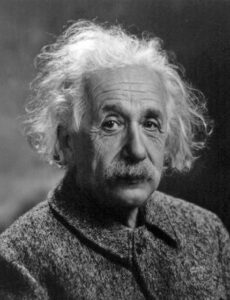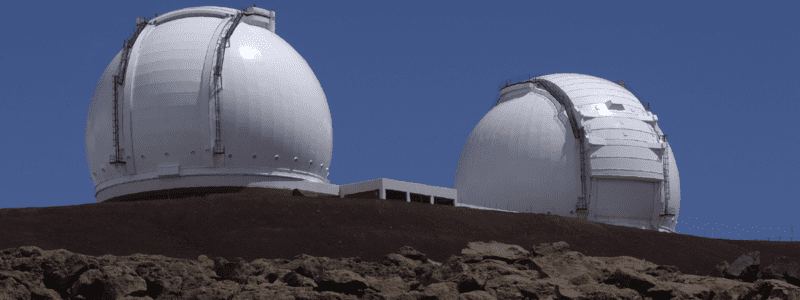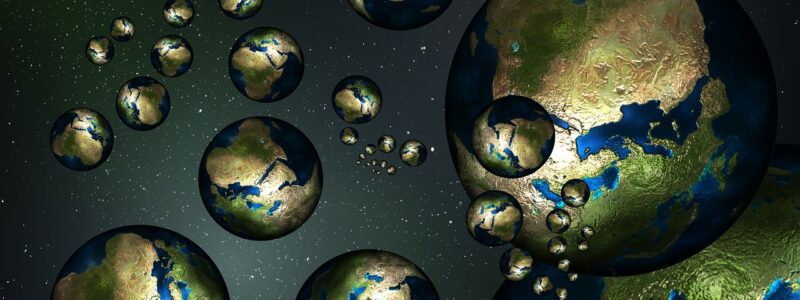Kalam Cosmological Argument
The Kalam Cosmological Argument is an attempt to demonstrate the existence of God by showing the universe is created and not eternal or self-existent. The greatest minds throughout history have attempted to characterize the universe. However, these characterizations were primarily philosophical, as there was no way to objectively evaluate the universe’s characteristics until very recently.
One main concern of these philosophical meanderings was whether the universe was infinite in size and
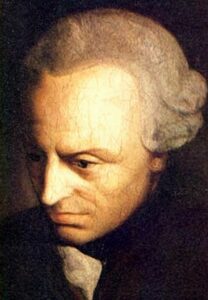
Immanuel Kant
age. Ancient Greek philosophers such as Aristotle believed that matter was uncreated and eternal, making the universe eternal.
Jewish thought, informed through Scripture, believed all creation had a beginning in time. God created the heavens and the earth at some specific moment in the past before which neither existed. The first verse of Genesis states: “In the beginning, God created the heavens and the earth.”
This difference of opinion was expounded upon by the great eighteenth-century German philosopher Immanuel Kant. He held there were rationally compelling philosophical arguments for whether or not the universe had a beginning and could not determine which one was correct. Philosophy can only provide logical answers up to a point.
William Craig initially formulated the Kalam version of the Cosmological Argument. He recognized the contributions of Islamic philosophers and theologians in this field of research. “Kalam” is the Arabic word for medieval theology. This formulation has prompted significant interest in the age-old problem of cosmic origins. The Cambridge Companion to Atheism notes,
A count of the articles in the philosophy journals shows that more articles have been published about … the Kalam argument than have been published about any other … contemporary formulation of the argument for God’s existence … theists and atheists alike cannot leave [the] Kalam argument alone. (p. 183).
Meet Al-Ghazali and the Kalam Cosmological Argument
Al-Ghazali was a twelfth-century Islamic theologian from Persia – now modern-day Iran. He was concerned that other Muslim philosophers were misleading his people into accepting Greek philosophy and denying the existence of God.
In response to this destructive trend, Ghazali wrote a book offering a critique of their views entitled The Incoherence of the Philosophers. He makes the strong assertion that a beginningless, eternal universe is absurd. The universe must have a beginning since nothing begins to exist without a cause.
He formulated his argument very simply,
Every being which begins has a cause for its beginning; now the world is a being that begins; therefore, it possesses a cause for its beginning.
Ghazali’s philosophical arguments can break down Ghazali’s intelligent discussion into three premises:
- Whatever begins to exist has a cause for its beginning
- The universe began to exist
- Therefore, the universe has a cause for its beginning.
Premise (1) is restated more modestly as,
- The universe began to exist, and then the universe had a cause for its beginning
This more focused first premise relies upon modern cosmology asserting the universe began to exist at one point in time – it is not eternal as had been believed for thousands of years since the ancient Greeks.
The whole universe can not come into being without a cause. Some physicists might argue that the virtual particles do come into being from nothing in quantum decay events. However, this is not entirely true. Britain’s quantum cosmologist Christopher Isham cautions
Care is needed when using the word ‘creation’ in a physical context. One familiar example is the creation of elementary particles in an accelerator. However, what occurs in this situation is the conversion of one type of matter into another, with the total amount of energy being preserved in the process.
A thought experiment might prove valuable here. For example, suppose an entire universe could come into being from nothing somehow through processes we do not yet understand. Then, why do much smaller bits of matter pop into existence and stay in existence for prolonged periods? Undoubtedly, the smaller bits of matter the size of a house coming randomly into existence would be vastly more likely than an entire universe. But that is not our shared experience and has never been overserved.
The Universe Began to Exist
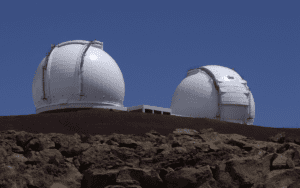
By T. Wynne / JPL – http://planetquest.jpl.nasa.gov/images/keckTelescopes-hi.tif, Public Domain, Link
The universe’s beginning at a point in time is a hotly contested issue. There were philosophical arguments regarding the universe’s initial state long before there was empirical evidence.
Ghazali argued that if the universe is eternal, there would be an infinite number of past events before today. However, Ghazali recognized that an infinite number of past events could not exist. Furthermore, he realized the absurd consequences of an infinite number of past events.
For example, if something or somebody claims to have been present when the universe began an eternity ago, you would know he was lying. Why? Because if he started to exist at year one an infinite number of years ago, and then went to year two, then year three, he could never count up to the infinite year of the current year.
Since the series of past events over the lifetime of an infinite universe would be infinite. Still, since you can not count the series of past events to an infinite number, there can not be an infinite number of past events in the universe. The logic construction is,
- A collection formed by successive addition cannot be an actual infinite,
- The temporal series of events is a collection formed by subsequent addition
- Therefore, the temporal sequence of events can not be infinite.
Scientific Confirmation that the Universe Began to Exist
Ghazali could not have conceived how science has confirmed his philosophical assertion that the universe can not be infinitely old or large in his wildest dreams. The first scientific observation that confirmed the finite age of the universe came from observing the universe’s expansion.
Gazing up into the sky on a clear moonless night away from light pollution is astounding. You can see thousands of stars and the band of stars known as our galaxy – the Milky Way. For thousands of years, astronomers and philosophers thought the universe was unchanging. Of course, things in the universe were moving around, such as planets, but the universe was overall stable. Albert Einstein also assumed an endless, eternal universe when he began to apply his new theory of gravity, called the General Theory of Relativity, to the universe in 1917.
But Einstein found something troubling. The equations described a universe either getting larger like a balloon or collapsing in upon itself. Then, during the 1920s, other scientists extended Einstein’s mathematical models. The Russian mathematician Alexander Friedman and the Belgian astronomer Georges Lemaitre came up with an expanding universe using Einstein’s equations.
But these were just mathematical models which most laypeople could not understand. It would be up to the American astronomer Edwin Hubble to find observational confirmation of the expanding universe. Using the Mt. Wilson Observatory, he made the discovery that verified Einstein, Friedman, and LeMaitre. He discovered that light from distant galaxies appeared to be redder than expected. This “redshift” is due to light stretching as the light source moves away.
The Friedman-LeMaitre eventually became known as the Big Bang theory. However, the name is somewhat misleading as the universe did not result from an explosion in space but rather from the initial creation of matter in a minimal volume of space that expands. The expanding space expands the matter within it.
The consequences of this scientific development are astounding as it supports the Biblical narrative of the initial creation of all that is in existence. So naturally, cosmologists have worked tirelessly to develop a model that does not require an absolute beginning and the theological consequences that come with it. However, these alternative theories all eventually fall apart when faced with improving observational data.
The prediction of an absolute beginning of the universe and time itself was developed more than 100 years ago and has withstood growing knowledge of physics involved and increasingly accurate observational data.
The Borde-Guth-Vilenkin Theorem Confirms the Kalam Cosmological Argument
A series of singularity theorems have been developed during the past two decades, confirming the universe’s absolute beginning in space and time.
In 2003 Arvind Borde, Alan Guth, and Alexander Vilenkin showed that any universe, which on average is in a state of expansion, cannot be of infinite age but must have had a beginning. The need for a beginning also goes for multiverse scenarios. In 2012, Vilenkin demonstrated that models that do not meet this condition still fail for other reasons and must have begun. He noted,
None of these scenarios can actually be past eternal. … All the evidence we have says the universe had a beginning.
The Borde-Guth-Vilenkin theorem shows chat classical space-time cannot be extended to an infinite past but must reach a beginning at some time in the finite past.
Indeed, there will be challenges to the argument due to its theological implications. However, current cosmologists seem to agree that the universe must have had an absolute beginning.
The Entropy Argument for a Beginning
The second scientific argument relies upon the very well-known Second Law of Thermodynamics. According to this law, in a closed system like the universe, the system will become more and more disorderly over time.
Eventually, the energy in the universe will spread evenly throughout the universe. The universe, at that point, becomes a featureless place with no stars, no planets, and most certainly no life.
If given enough time, the universe becomes featureless without life, and if the universe is infinite in age, why has this not occurred? Therefore, a lifeless universe has not happened (because you are alive!), so the universe can not have an infinite age.
Quantum Gravity to the Rescue?
Aron Wall of the University of California formulated a new singularity theorem in 2013, which shows the new science of quantum gravity falls short. He further reports that since his results require the validity of only certain basic concepts,
it is reasonable to believe that the results will hold in a complete theory of quantum gravity.
Summary of the Cosmological Argument
Philosophical and scientific evidence point squarely to confirm the universe’s absolute beginning in space and time.
Since the universe began to exist and was created from absolutely nothing, absolutely nothing, its cause must be external to the universe.
The cause itself must be uncaused since, as we have seen, an infinite regression of causes is impossible.
It must transcend space and time since it created space and time. Therefore, this cause must be transcendent – it must be immaterial and non-physical. It must be unbelievably powerful since it created all matter and energy.
Ghazali also noted that since the universe is not eternal, it was created by a being with freedom of will. Thus, freedom of will makes it possible to have an effect (the creation of the universe) beginning from a permanent, timeless cause.
These considerations bring the argument to not only a transcendent cause of the universe but to its Personal Creator.
To quote William Craig,
Ghazali’s cosmological argument thus gives us powerful grounds for believing in the existence of a beginningless, uncaused, timeless, spaceless, changeless, immaterial, enormously powerful, Personal Creator of the universe.
Sound like anybody you know?
Reference
https://www.reasonablefaith.org/writings/popular-writings/existence-nature-of-god/the-kalam-cosmological-argument


